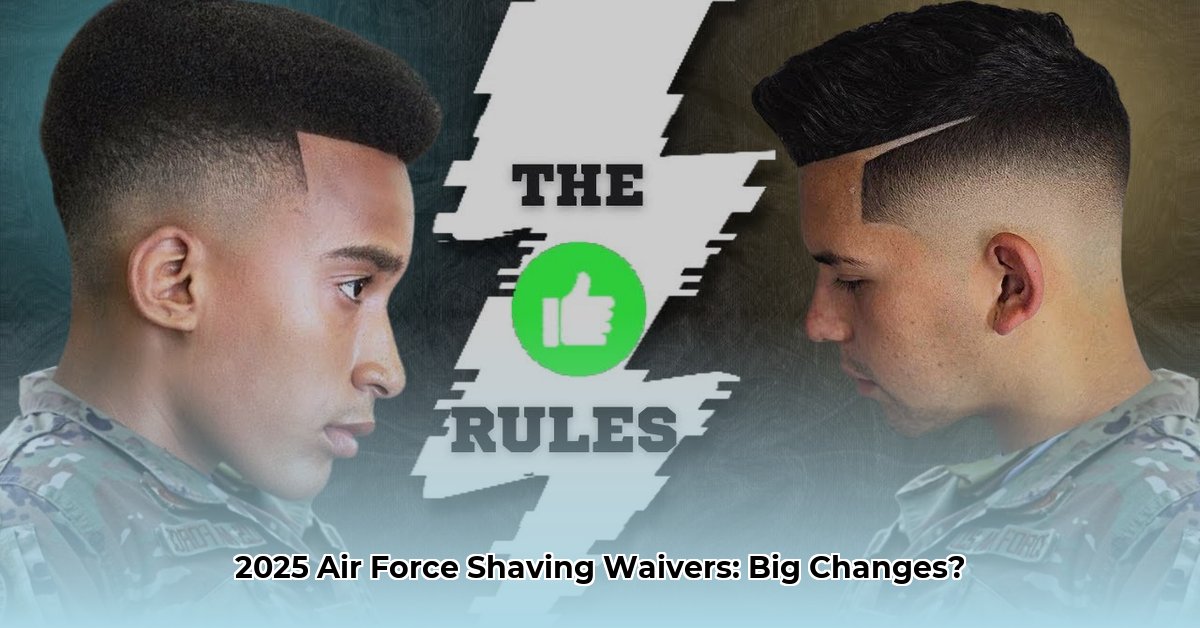Shaving Waiver Changes: What You Need to Know
Effective March 1, 2025, the Air Force updated its shaving waiver policy, requiring annual reviews for all medical waivers, primarily affecting Airmen with pseudofolliculitis barbae (PFB). This change does not affect religious waivers.
Understanding the Policy Update
This update mandates annual shaving waiver confirmation during your PHA, ensuring waivers remain medically necessary and promoting standardized grooming across the force. This more frequent review may lead to earlier detection of skin condition changes and more personalized care. This shift suggests a potential increase in short-term shaving profiles and closer monitoring of PFB cases, especially during a time when the Air Force is re-evaluating medical necessities and striving for uniformity in appearance.
How to Renew Your Shaving Waiver
- Annual PHA: Discuss your shaving waiver with your healthcare provider during your annual PHA.
- 90-Day Follow-up: After your PHA, schedule a follow-up appointment within 90 days to re-evaluate your PFB and confirm your waiver.
- Documentation: Ensure your medical records accurately reflect your PFB status and treatment history.
- Confirmation: Receive confirmation of your renewed waiver, valid for one year, or until your next PHA.
- Questions: Contact your chain of command or base Public Affairs for any questions or concerns.
New Grooming Standards Summary
Beyond shaving waivers, the Air Force has implemented other grooming standard adjustments:
- Hair Length: Hair must be off the ears.
- Nail Polish: Limited to clear, French, or American manicures.
- Duty Identifier Tabs (DIBs): Streamlined for a more consistent look. Consult AFI 36-2903 for specifics.
- Gig Line: Strict adherence to gig line requirements for dress uniforms.
PFB and the New Policy
Airmen with PFB may experience more frequent follow-ups and temporary shaving profiles. While these changes might mean more appointments, they likely signal a greater focus on personalized care and effective PFB management. The Air Force is distinguishing between true PFB and razor irritation to provide appropriate treatment and waivers. For milder cases, more frequent monitoring and temporary shaving profiles are probable, while long-term waivers remain a possibility for severe PFB.
Addressing Potential Concerns
Some concern exists about potential bias in the annual review process, especially given PFB’s prevalence among Black Airmen. Ensuring fair and unbiased evaluations across all bases is crucial. Ongoing research may explore standardized evaluation criteria and training to mitigate bias. Though the Barrier Analysis Working Groups were disbanded, the Air Force remains committed to diversity and inclusion, and addressing these concerns is vital for maintaining trust and ensuring equal opportunity. This also has potential far-reaching implications for recruitment and retention within the Black community.
Frequently Asked Questions (FAQ)
- What happens if my waiver is denied? Explore alternative PFB management options with your healthcare provider, such as different shaving techniques or skincare routines. You can also explore the appeals process through your chain of command.
- Where can I find more information? Consult AFI 36-2903 or contact your unit leadership or base Public Affairs.
Future Updates
This section will be updated with any further policy changes. Stay informed by checking back regularly and consulting official resources. For the most current information, refer to AFI 36-2903, Dress and Personal Appearance of Air Force Personnel. (Please note that while this link currently directs to the AFI, the specific content related to the 2025 update will be incorporated as it becomes officially available. Check this location periodically for the latest version.)
- Hydroelectric Power Basics How Water Is Used For Electricity - February 26, 2026
- Portable Water Generators Power Off-Grid Homes and Adventures - February 25, 2026
- Portable Hydroelectric Power Generators Light Up Off-Grid Living - February 24, 2026
















